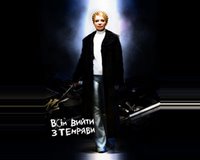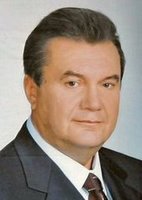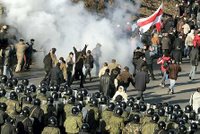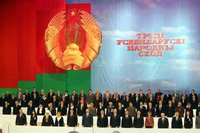 Will Sunday 26 March 2006 go down in Ukrainian history as the end of the Orange Revolution? This is undeniably the impression one may get when half the votes of Sunday's parliamentary elections have been counted. Last year the Ukrainian people ousted Viktor Yanukovich for fraud in the presidential elections. Now, he stands as victor in the first parliamentary elections since the orange revolution. Is this - in line with Yanukovich's party colour - the blue counter-revolution?
Will Sunday 26 March 2006 go down in Ukrainian history as the end of the Orange Revolution? This is undeniably the impression one may get when half the votes of Sunday's parliamentary elections have been counted. Last year the Ukrainian people ousted Viktor Yanukovich for fraud in the presidential elections. Now, he stands as victor in the first parliamentary elections since the orange revolution. Is this - in line with Yanukovich's party colour - the blue counter-revolution?
With some 27% of cast votes, Yanukovich's
Party of Regions is currently in the lead ahead of
Yulia Timoshenko's 23% and Yushchenko's
Our Ukraine's 16%. That Yanukovich would win the elections comes as no surprise, with polls giving him some 30% support over the past months. What came as more of a surprise is that president Yushchenko stands out as the big loser in the elections at the same time as Timoshenko has strengthened her support by almost 10% more than was expected only a few weeks ago.
What now? Judging from the results, it is still no done deal which parties will form the new government. As of now, two other parties - the Communists and the Socialists - have crossed the 3% threshold to parliament. It thus seems as if we are in for a lot of negotiations over the next week to form some sort of a coalition government, and what options are possible will be clear only when we know how big each party's parliamentary representation will be.

What is by now quite clear, is that president Yushchenko may have great difficulty to exercise his power during the remainder of his time in office. The results are not only a humiliating blow to Yushchenko, who thereby is made a scapegoat of failed policies over the past year. Due to changes in the constitution, presidential power has also been reduced and now Yushchenko may lack parliamentary support to back his policies, potentially making him into a lame duck. The question is if he will accept the roles of both scapegoat and lame duck?
In an attempt to seize the initiatve, Yulia Timoshenko called for talks with president Yushchenko to form a new orange coalition
between her party,
Our Ukraine and the
Socialist Party, headed by Moroz. The question is whether Yushchenko has much alternative to accepting this proposal, even if it

might make him a puppet on a chain in the hands of Timoshenko. In September last year, former orange allies Yushchenko and Timoshenko had what seemed as a final fallout and Timoshenko was sacked from the post of prime minister. If an orange coalition is to rule Ukraine after the elections, Timoshenko's comeback to power is assured. The question is also whether the Socialists may be able to again join forces with their former orange allies in conforming to the government policies of Yushchenko and Timoshenko. This has proved complicated in the past.
The alternative to the Socialists would then be to join forces with Yanuko

vich's Party of Regions and Symonenko's
Communist Party to govern Ukraine in an anti-Yushchenko coalition. Such a coalition would improve relations with Russia at the same time as Yanukovych might have greater diffuculty to develop relations with the European Union than he would really want to. Such a blue coalition might also be better in tune with popular sentiments than the orange alternative, which may prove a factor in coalition negotiations. A third option of forming a Yanukovich-led grand coalition with
Our Ukraine and the
Socialists must now be ruled out as it would include the loser -
Our Ukraine - and exclude a winner - the
Timoshenko bloc. This is not the message the voters sent and - in contrast to 2004 - Ukrainian politicians have learnt to listen a little more to the people.
What government alternative eventually evolves is still unclear, but Ukrainian politics certainly have taken a peculiar twist, which only will make it the more interesting in the coming years. What, to the contrary, is already clear is that Yushchenko no longer can rest on his laurels as the hero of the Orange revolution - regardless of whether he will turn out a scapegoat, a lame duck or a puppet on a chain. The big question, however, is what it would mean if Ukraine now turns from orange to blue with a comeback of Viktor Yanukovich as Prime Minister. Hopefully - if not altogether realistically - this day will never come. As for the future of the orange revolution, the people and not the politicians will be the better judges on that, and this was an election - not a revolution.
 Ukraine, elections, orange, blue, revolution, Yushchenko, Timoshenko, Yanukovich, Moroz, Symonenko
Ukraine, elections, orange, blue, revolution, Yushchenko, Timoshenko, Yanukovich, Moroz, Symonenko
 Unity has been reached on an orange coalition government in Ukraine between president Viktor Yushchenko's Our Ukraine, the Timoshenko Bloc, and the Socialist Party, a spokesman of Our Ukraine stated to Reuters on Thursday.
Unity has been reached on an orange coalition government in Ukraine between president Viktor Yushchenko's Our Ukraine, the Timoshenko Bloc, and the Socialist Party, a spokesman of Our Ukraine stated to Reuters on Thursday.
























